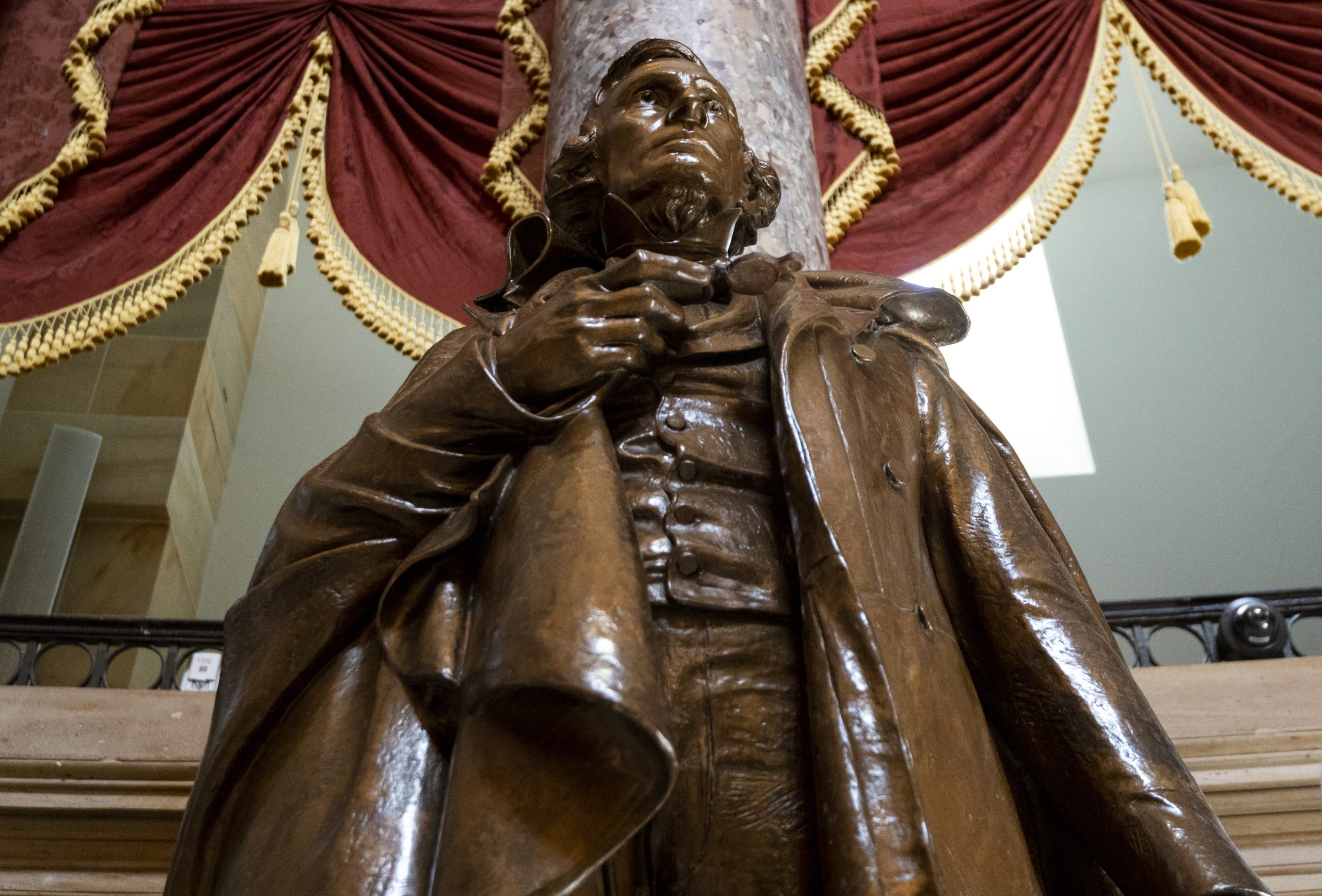Mississippi Today
Other Southern states removed white supremacist statues from Washington. Will Mississippi?

State lawmakers recently filed legislation to replace Mississippi's two statues of white supremacists in the U.S. Capitol in Washington — a move that would follow the lead of several other Southern states.
House Minority Leader Robert Johnson III, a Democrat from Natchez, filed a resolution to replace statutes of Jefferson Davis and J.Z. George in the U.S Capitol's National Statuary Hall Collection with statues of civil rights icon Fannie Lou Hamer and Hiram Revels, the first African American to serve in Congress.
Senate Minority Leader Derrick Simmons, a Democrat from Greenville, filed a measure to create a commission to select replacements for the Davis and George statues.
“I just don't think having statues that represent the Confederacy is a correct representation of who Mississippi is,” Johnson said. “And I just think it's time for change.”
Each U.S. state is allowed to place two statues of people “illustrious for their historic renown” or “distinguished civil or military services,” after Congress passed a federal law in the mid-nineteenth century establishing the national collection.
Around 3 to 5 million people pass through the collection in the Capitol each year, according to the Architect of the Capitol's website, to glance at who are supposed to be the country's most reputable figures.
But the leaders of the Magnolia State, who often boast about Mississippi's literary, musical and artistic impact on the country, continue to honor the legacy of two slave owners who actively worked to maintain the white power structure of their day.
Both Davis and George were leaders of the Confederacy, and their vivid racism is well documented.
Davis served in the U.S. House and Senate from Mississippi before becoming the first and only president of the Confederate States of America, which fought to preserve slavery. Davis later said in a speech to the Mississippi Legislature that if he had the chance to change any of his past actions about secession, he would not do anything differently.
George was a member of Mississippi's Secession Convention in 1861, and he signed the secession ordinance that included these words: “Our position is thoroughly identified with the institution of slavery — the greatest material interest of the world.”
George served in the Confederate Army and was also the architect of the 1890 Constitution that sought to reestablish white supremacy in the state and disenfranchise Black citizens from voting or holding elected office.
The Mississippians who initially honored George and Davis with statutes also had ties to the Confederacy or sympathized with the Confederacy.
A columnist at the time interviewed David Bramlette Jr., one of the men who selected Davis and George, and invited all Mississippians to attend the unveiling ceremony in Washington. The column specifically noted that “general officers of the Confederate organization” were invited to attend.
The article went on to quote Bramlette saying the reason the state honored George with a statue was because he was a “great constitutional lawyer and a leader in the preservation of the white, Anglo-Saxon civilization of the South.”
Many Southern states have replaced their original statues of Confederate leaders with more inclusive figures. Alabama, in 2009, replaced a statue of Jabez Lamar Monroe Curry, a Confederate officer, with one of Helen Keller, a political activist and disability rights advocate.
Arkansas is in the process of replacing statues of Uriah Milton Rose, a Confederate sympathizer, and James Paul Clarke, a former U.S. senator, with statues of civil rights activist Daisy Bates and musician Johnny Cash.
Florida, in 2016, approved a measure to replace Confederate Gen. Edmund Kirby Smith with Mary McLeod Bethune, a civil rights activist and founder of a Florida university.
Virginia, in 2020, removed Confederate General Robert E. Lee from the collection and plans to replace it with civil rights activist Barbara Rose Johns.
To change a statue, federal law requires a majority of lawmakers in both legislative chambers to vote to approve the replacement, and the state is required to pay for the costs of replacing the two statues.
Mississippi's Republican committee leaders in the House and Senate were noncommittal about Johnson and Simmons' proposals to change out the Davis and George statues.
House Speaker Jason White referred Johnson's proposal to two committees for consideration: the House Rules Committee and the House State Affairs Committee. The measure must pass both committees before the entire House can consider it.
House Rules Committee Chairman Fred Shanks, R-Brandon, said he did not know much about the National Statuary Hall Collection, but that he would review Johnson's proposal.
Lieutenant Governor Delbert Hosemann referred Simmons' proposal to the Senate Rules Committee, which is led by Sen. Dean Kirby, R-Pearl.
“I'll probably poll the committee and see where we are,” Kirby said. “If I see that it's a real negative, I probably will not bring it up.”
Both Johnson and Simmons said they are open to suggestions for who should replace Mississippi's statues, but they want it to honor someone who is more representative of a modern-day Mississippi.
“I want two individuals that when my children who are 5 and 10 can look back 50 years from now and they will say those two representations of Mississippi are still positive representations of Mississippi,” Simmons said. “The unfortunate thing is we can't say that now.”
This article first appeared on Mississippi Today and is republished here under a Creative Commons license.
Did you miss our previous article…
https://www.biloxinewsevents.com/?p=330744
Mississippi Today
Law enforcement officers’ oversight bill heads to governor’s desk
The Mississippi Senate passed legislation Monday to give the state's officer certification board the power to investigate law enforcement misconduct.
House Bill 691, the revised version of which passed the House Saturday, is now headed to the desk of Gov. Tate Reeves.
The bill comes in the wake of an investigation by the Mississippi Center for Investigative Reporting at Mississippi Today and The New York Times into sheriffs and deputies across the state over allegations of sexual abuse, torture and corruption. The reporting also revealed how a “Goon Squad” of officers operated for two decades in Rankin County.
Public Safety Commissioner Sean Tindell said if the governor signs the bill, he anticipates the Mississippi Board on Law Enforcement Officer Standards and Training would hire a few investigators to investigate matters and make recommendations.
The bill would enable the board to establish a hearing panel on any law enforcement officer “for whom the board believes there is a basis for reprimand, suspension, cancellation of, or recalling the certification of a law enforcement officer. The hearing panel shall provide its written findings and recommendations to the board.”
In addition, deputies, sheriffs and state law enforcement would join police officers in the requirement to have 20 hours of training each year. Those who fail to get such training could lose their certifications.
Other changes would take place as well. Each year, the licensing board would have to report on its activities to the Legislature and the governor.
The bill calls for a 13-member board with the governor having six appointments – two police chiefs, two sheriffs, a district attorney and the head of the law enforcement training academy.
Other members include the attorney general, the public safety commissioner, the head of the Highway Patrol, and the presidents of the police chiefs association, the constable association, the Mississippi Campus Law Enforcement Association and the sheriff's association (or designee).
This article first appeared on Mississippi Today and is republished here under a Creative Commons license.
Mississippi Today
Legislators extend 2024 session after missing budget deadline
Legislative leaders are optimistic that they will be able to start passing bills to fund the $7-billion budget to fund state services on Tuesday.
“We will be rolling Tuesday and the day after I suppose,” said Senate Appropriations Chair Briggs Hopson, R-Vicksburg.
Late Monday the House and Senate agreed on a resolution to extend the session. Appropriations and revenue (taxes and borrowing) bills died Saturday night when House and Senate leaders could not reach agreement on a key deadline. The resolution approved Monday was needed to revive the bills.
The final day of the session was scheduled for Sunday, May 5. Now it is scheduled for May 14, but House Speaker Jason White, R-West, predicted Monday that the Legislature will finish its work this week, though leaders did concede there were still some “minor” disagreements between the House and Senate.
Under the resolution, the legislators – even though their work would be completed this week — will return on May 14 unless White and Lt. Gov. Delbert Hosemann agree not to return.
Returning on May 14 would give the Legislature the opportunity address any possible vetoes by Gov. Tate Reeves. Lawmakers can override gubernatorial vetoes with a two-thirds vote of each chamber.
Asked Monday if an agreement had been reached on the revenue bills, Senate Finance Chairman Josh Harkins, R-Brandon, who handles those proposals, said, “Gosh, I hope so. If not I am going holler a Jerry Clower for them to shoot up amongst us,” Harkins said referencing a skit by the Mississippi comic.
It took a two-thirds vote of both chambers to pass the resolution to extend the session. It passed unanimously in the House, but six members of the 52-member Senate voted no. Without the resolution, it most likely would require a special session called by Gov. Tate Reeves to pass budget bills and revenue bills.
This article first appeared on Mississippi Today and is republished here under a Creative Commons license.
Mississippi Today
Lawsuit in death of man following Jackson police encounter may be headed to trial
The family of George Robinson plans to move forward with a wrongful death lawsuit against the city of Jackson and three former police officers after rejecting a nearly $18,000 settlement offer.
Attorney Dennis Sweet III made the intentions of Bettersten Wade, Robinson's sister, and Vernice Robinson, Robinson's mother, clear in a Thursday letter sent the day after the City Council approved a $17,786 payment to settle the family's 2019 lawsuit.
“This is more than anyone should have to endure. Much less have the City of Jackson tout the purported term of settlement as some sort of victory,” Sweet wrote in the letter. “Needless to say, no individual or party obtained a victory in this matter.”
The financial terms of the settlement and plaintiffs' identities were not supposed to be disclosed publicly and the council did not approve the settlement in executive session, Sweet said. According to Mississippi's open meeting law, any public body can enter executive session for a number of reasons, including for negotiations relating to litigation.
Sweet was not immediately available to comment Monday. Last week, he told WLBT he would take it to trial.
Council President Aaron Banks, who was also not immediately available for comment, said the settlement was freely negotiated among the parties and signed by Wade and Vernice Robinson, who had their attorneys with them, according to a Friday statement to the Clarion Ledger.
Banks disputed Sweet's claims that the city violated any terms of the settlement, such as a confidentiality agreement, saying the city didn't agree to one and that settlements are public records, according to the statement.
“The City intends to honor the agreement it reached and expects the Wade family to do so, also,” Banks said in the statement.
However, some city council members said after the meeting that they were not aware of a confidentiality agreement.
City Attorney Drew Martin declined to comment Monday.
All the parties met for mediation April 12. Sweet said that during the session, a representative from the city said it is in “financial straits and did not possess substantial funds in which to resolve Ms. Wade's claims against it.” The lawsuit complaint asked for a jury trial and damages to be determined by a jury.
Banks's statement did not address the attorney's claim about the city's finances.
Wade agreed during mediation to settle with ambulance provider American Medical Response and to allow the city to join that settlement and end litigation, according to Sweet's letter.
“Had AMR not agreed to a substantial settlement amount, Ms. Wade would not have settled with the City of Jackson,” he wrote in the letter.
The company settled for a different amount that was not disclosed, according to Sweet's letter.
As of Monday, electronic court filings for the lawsuit do not show that the judge has signed off on a settlement.
In January 2019, 62-year-old Robinson was pulled from a car and beaten by officers, leaving him with severe injuries. At the time, he was recovering from a stroke. Robinson died days later.
In 2022, former detective Anthony Fox was convicted culpable-negligence manslaughter for Robinson's death, while charges against officers Desmond Barney and Lincoln Lampley were dismissed a year earlier.
Fox was incarcerated until January when the Mississippi Supreme Court overturned his conviction and issued an acquittal, freeing him. Fox has returned to work for the Canton Police Department.
This isn't Wade's only loss and fraught experience with the city, Sweet said.
Last year, her son Dexter died after being hit by a car driven by an off-duty Jackson police officer. He was buried unidentified in the Hinds County pauper's field, despite having identification on him. His family did not know he was there until months later.
This article first appeared on Mississippi Today and is republished here under a Creative Commons license.
-
Local News5 days ago
Sister of Mississippi man who died after police pulled him from car rejects lawsuit settlement
-
Mississippi Today5 days ago
At Lake High School in Scott County, the Un-Team will never be forgotten
-
Mississippi Today2 days ago
On this day in 1951
-
Mississippi News3 days ago
One injured in Mississippi officer-involved shooting after chase
-
Mississippi News6 days ago
Viewers make allegations against Hatley teacher, school district releases statement – Home – WCBI TV
-
Mississippi News Video5 days ago
Vehicle struck and killed man lying in the road, Alcorn County sheriff says
-
Mississippi News4 days ago
Ridgeland man sentenced for molesting girl
-
Mississippi News5 days ago
Suspected Dollar General armed robber arrested in Pickens County
































